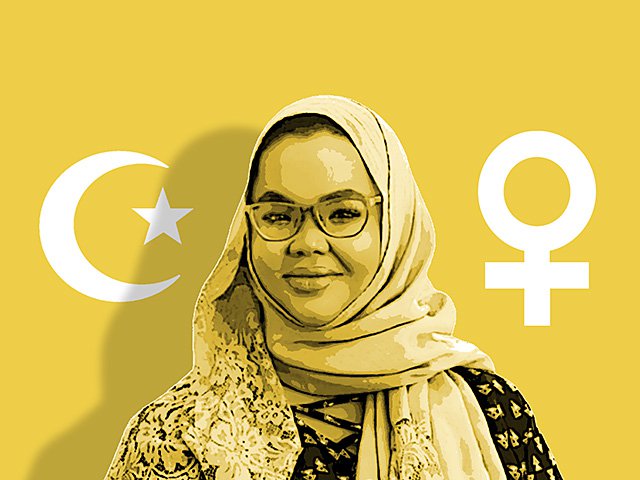[ad_1]

“GOP’s abortion policies look a lot like Sharia Law,” tweeted Rachel Bitecofer, a political branding specialist and polling expert, on May 9.
Others argued this same point on social media following Politico’s reporting on a leaked draft opinion in Dobbs v. Jackson Women’s Health Organization, the case in front of the U.S. Supreme Court that will most likely result in the overturning of Roe v. Wade this summer. From concerned suburban moms to nationally renowned political scientists, liberals were quick to equate Justice Samuel Alito’s decision to overrule the landmark 1973 case that legalized abortion with a generalized — and incorrect — interpretation of Islamic law.
“This is Taliban-level fascism,” one person wrote. “The Burka is next” tweeted another.
As a practicing Muslim, who is also pro-choice, watching this play out was frustrating. Contrary to the impression created by the social media posts, abortion is not directly prohibited in Islam. In fact, Islamic legal jurisprudence likely falls to the left of the upcoming (God forbid) majority opinion of the U.S Supreme Court.
For Sunni Muslims like myself, abortions are permitted by Islamic law out of medical necessity. There is no direct prohibition on abortion in the Quran and Sunnah, the two most authoritative biblical sources.
While “life” is believed to start on the 120th day of gestation, the well-being of the pregnant person takes precedence in cases where the fetus presents a risk at any point during the pregnancy. And even though disagreements between different schools of Islamic jurisprudence exist on abortions that happen outside of medical need, and after 120 days, abortion is not a punishable action by any means no matter the school of Islamic law.
At the very least, the no-exceptions abortion bans conservatives are lobbying for do not mirror Islamic practice or legal tradition.
And let’s be real. For years, the fight to overthrow Roe has been led, shaped, and championed by right-wing, Christian fundamentalists, not Muslims.
But whether or not Islam or Christianity allow for abortion should not matter; religion should not play a role in determining who can receive reproductive care. Religion should not play a role in the decisions of the U.S. judiciary at all.
And yet, it does.
For decades, right-wing Christian values have deeply influenced the legal and political culture of the United States. In the 2014 decision in Burwell v. Hobby Lobby Stores, the U.S. Supreme Court ruled that requiring family-owned corporations to pay for insurance coverage for contraception under the Affordable Care Act violated a federal law protecting religious freedom. In the 5-4 majority opinion, Justice Alito cited Catholic theologians.
And as a result of that ruling, according to Vox, the Court now nearly always sides with religious conservatives who seek exemptions from law, even when granting such an exemption is likely to injure others. Not only that, but the decisions of conservative justices are also heavily influenced by their own religious views. Conservative dissents regarding same-sex marriage, contraception, and interracial marriage have deferred to right-wing Christian values or placated them over the years.
In the draft opinion for Dobbs v. Jackson, Alito draws on two 17th century treatises written by Sir Matthew Hale, an English jurist, who described abortion as a “great crime” and a “great misprision.”As Emily Bell of Columbia University has pointed out, Hale also laid the foundation for a marital rape exemption that said husbands cannot be guilty of raping their wives because “by their mutual matrimonial consent and contract the wife hath given up herself.”
And so we find ourselves, in 2022, on the verge of losing our right to bodily autonomy because of the opinion of an English jurist influenced by the Puritan values of the 17th century. Or perhaps, the opinion of a man who thinks like a 17th century English jurist. Alito and his concurring colleagues are set on transporting our nation back to a time when the church was a powerful political influence in the matters of the state.
You don’t have to invoke Sharia law to describe this sort of religious extremism. There’s already a word for it, Christofascism.
But perhaps the mention of religion as it relates to the precarious legal future of Roe v. Wade isn’t all bad. Public discourse needs to reckon with whether or not the Supreme Court operates as an authoritarian theocracy. And if so, how to change course and bring about true separation of church and state in this country.
As a Muslim, I want the freedom to practice my religion constitutionally protected. But I don’t want my beliefs imposed on others by an activist Supreme Court. Religious values should never strip away reproductive rights from a diverse American society.
Nada Elmikashfi is chief of staff to state Rep. Francesca Hong and a former candidate for state Senate.
[ad_2]
Source link

